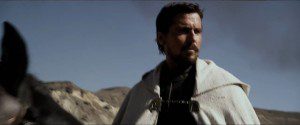 With the film set to open in South Korea, Spain, Australia and a few other countries this week, the first reviews of Exodus: Gods and Kings went online today — and they’re a mixed bag, as reviews of Ridley Scott films are wont to be.
With the film set to open in South Korea, Spain, Australia and a few other countries this week, the first reviews of Exodus: Gods and Kings went online today — and they’re a mixed bag, as reviews of Ridley Scott films are wont to be.
One of the recurring themes in these reviews is that the film offers a lot of spectacle but not as much character development as it should — which leads one to wonder if an even longer, better “director’s cut” awaits us, à la Kingdom of Heaven.
The reviews also explore, in greater detail than we have seen so far, how the film goes about providing “natural” explanations for the plagues and other miracles.
What follows are excerpts from the reviews, but beware: there are spoilers here.
First, Justin Chang at Variety gives the film perhaps its most positive review so far:
“It’s not even that good a story,” Moses grumbles early on in Ridley Scott’s “Exodus: Gods and Kings,” shortly after learning of the mysterious events that transformed a lowly Hebrew slave into a full-blown prince of Egypt. It’s a sly, knowing wink from a filmmaker who clearly has a terrific tale on his hands, yet faces a bit of a challenge in selling it to a more cynical, less easily razzle-dazzled audience than those that greeted the biblical epics of yesteryear. What’s remarkable about Scott’s genuinely imposing Old Testament psychodrama is the degree to which he succeeds in conjuring a mighty and momentous spectacle — one that, for sheer astonishment, rivals any of the lavish visions of ancient times the director has given us — while turning his own skepticism into a potent source of moral and dramatic conflict.
If this estimable account of how God delivered His people out of Egypt feels like a movie for a decidedly secular age, its searching, non-doctrinaire approach arguably gets closer to penetrating the mystery of faith than a more fawning approach might have managed. Like “Noah,” the year’s other nonconformist Judeo-Christian blockbuster, this is an uncommonly intelligent, respectful but far-from-reverent outsider’s take on Scripture, although “Exodus” is less madly eccentric and more firmly grounded in the sword-and-sandal tradition than Darren Aronofsky’s film, and will almost certainly prove less polarizing among believers. . . .
Propelling the film through these absorbing early passages is Bale’s broodingly intelligent Moses, a cool, eloquent man of reason who disdains the God of Israel as well as the innumerable deities of Egypt, yet whose calm, rational demeanor can also be provoked to murderous fits of fury. The story of “Exodus: Gods and Kings” hinges on the gradual reshaping of his beliefs and the healing of his fractured identity: Humbled and exiled, he makes his way to Midian, where he becomes a shepherd and marries the beautiful Zipporah (Maria Valverde), though he has a difficult time truly accepting his place among the Hebrews and the Lord they worship. . . .
In one of his boldest strokes, Scott dramatizes the 10 plagues in a seamless, vividly realistic domino-effect montage — the bloody despoiling of the Nile (which takes a surprising page from “Jaws”) naturally giving way to a proliferation of gnats and frogs, boils and locusts — that truly does seem to capture the intensity of God’s wrath in one furious, unrelenting deluge. In keeping with the momentum established by Billy Rich’s editing and the superb vfx work, this Moses does not return to Ramses day after day with fresh entreaties of “Let my people go,” but instead remains in hiding, watching ambivalently as the Lord does their fighting for them. . . .
Stephen Farber at The Hollywood Reporter is more mixed:
Scott did a great job reviving the Roman sand-and-sandals epic when he made the Oscar-winning Gladiator. This Egyptian saga is not quite in the same league, but it confirms the director’s flair for widescreen imagery. Exodus has the added kick of 3-D technology, and it has enough eye-popping set pieces to please adventure fans. . . .
An early battle scene against the Hittites, modeled very closely on the climactic battle scene between Arabs and Turks in Lawrence of Arabia, suggests that Moses is the superior warrior, which prepares for his eventual banishment once Ramses succeeds his father on the throne. But the friendship between the two soldiers is not well established in the opening scenes, so the film stumbles out of the gate. Four writers—Adam Cooper, Bill Collage, Jeffrey Caine and Oscar winner Steven Zaillian—are credited with the screenplay, and they haven’t been able to craft an elegant narrative from the Biblical text. Their dialogue is often cringe-worthy, as when a surly Moses tells God, “Nice of you to come.” . . .
The film hits its peak in the sequence recounting the ten plagues. The savage crocodiles were not in the Old Testament, but as they attack humans as well as fish, they turn the Nile blood red, which is at least an ingenious explanation of how the river might have turned to blood. Frogs, boils, and locusts are truer to the text and are rendered in luscious visual detail. . . .
The movie should have ended there [at the Red Sea], but Scott and the writers seem to have felt obliged to include a few of the later parts of the story, including the delivery of the Ten Commandments and a scene of an aged Moses finally arriving near the land of Canaan. But while these events are integral to the Biblical story, they come off here as the worst kind of anticlimax. . . .
Alonso Duralde at The Wrap is more consistently down on the film:
If you’re going into “Exodus: Gods and Kings” thinking that director Ridley Scott is going to give the Moses story anything we didn’t already get from Cecil B. DeMille in two versions of “The Ten Commandments,” prepare to be disappointed. This stodgy adaptation creaks with solemnity — not to mention reactionary casting choices — and apart from some nifty frog and locust infestations, even the special effects pale next to a wind-blown Charlton Heston parting the Red Sea. . . .
Whether or not you found the looniness of Darren Aronofsky‘s “Noah” to be effective, at least it was an attempt to inject some life into an ancient tale, one where all the characters mainly exist in service to their role in the story, with perhaps a personality facet or two if they’re lucky. With the exception of Moses learning his true identity and grappling with his role in history — which Bale does fairly stiffly — everyone else gets one note to play, whether it’s arrogance or kindness or humility or sadism.
The big set pieces don’t pop enough to justify this movie’s existence; there’s a battle against the Hittites early on that has the sweep you’d expect from Scott, but it’s never as thrilling as some of the sequences in his director’s cut of “Kingdom of Heaven.” Even the parting of the Red Sea disappoints; the liberated Hebrews cross over in what seems like an accentuated low tide, and let’s just say that “Interstellar” has raised the bar on computer-generated giant walls of water. . . .
The film doesn’t come out in the United Kingdom or Ireland until Boxing Day, almost a month from now, but some British critics are already reviewing it too, presumably because the film’s global premiere takes place in London this Wednesday.
Robbie Collin at The Telegraph gives the film 3 stars out of 5:
Exodus is as poker-straight and pulverising as Kingdom of Heaven or Gladiator or any other Ridley Scott epic, with spectacular, screen-stretching battle scenes – but in moments like this [when Moses meets God], it makes a momentary, spluttering connection with your soul.
The film pits brother against brother, race against race, and mankind against God – or perhaps Nature, depending on how you read it. It’s the kind of stuff you might expect to find at a Werner Herzog retrospective, not a Friday evening at the multiplex. Though the film occasionally becomes too wrapped up in its own enormousness, you have to applaud Scott for the unwavering toughness of his vision. . . .
Scott’s refusal to mark out anyone as straightforwardly good gives Exodus a very different flavour to the morally clear-cut Biblical epics of the Fifties, and also to Darren Aronofsky’s Noah, a more poetic, hopeful adaptation of a well-known Old Testament tale. . . .
This is bold and uncompromising stuff from Scott; a Biblical epic to shake your faith in the order of things, not reaffirm it.
Catherine Shoard at The Guardan gives it 3 stars out of 5, too:
“Welcome to Pithom! You’ll get used to the smell.” So says Ben Mendelsohn at the start of Ridley Scott’s Moses movie. For a while now, people have been detecting something fishy about Exodus, what with the all-white casting and Scott’s reassurance there’d be a scientifically watertight explanation for that Red Seas business.
Might it turn out as non-kosher as Noah, 2014’s other Old Testament epic? Yet the final film, released in the UK on Boxing Day, looks set down to slip down if not a treat, then certainly smoother than anticipated. It is half turkey, half triumph – with an odour to match. . . .
The plagues are as well rendered as you’d hope given the $200m budget and cutting edge tech. Scott adds crocodiles and sharks to the mix for good measure and you do get a sense of relentless assault, what with the boils and the hail, the dead babies and the vomiting bulls. Even Moses himself has words with the Lord: “Is that it, are you done?”
In The Ten Commandments, God’s voice boomed back out at him from behind the burning bush; one of Scott’s innovations is God appearing to Moses as a 10-year-old boy. For Christian audiences who don’t find the Italia Conti intonation grating, this will likely be fine – a creative reading of God speaking in a still, small voice. The seas parting, too, are presented as all His work; there’s no forecast of how a cold front may result in tsunami-like conditions. . . .
Geoffrey MacNab at The Independent gives it 2 stars out of 5:
The film itself turns out to be a traditional, linear account of the Moses story that could have been taken from one of David Kossoff’s bible stories. It tries hard not to offend anyone too much, whether they’re Richard Dawkins or the most fervent of Christian believers. The key events – the burning bush, the parting of the Red Sea – are deliberately shrouded in ambiguity. Bale’s Moses has suffered a severe head injury and it is left to us to us whether he is really in touch with the Divine or whether his visions are the result of trauma. As for Moses leading his people across the sea, he may just have got lucky with the tides.
The storytelling is often brutal. Moses’ God is vengeful in the extreme toward the Egyptians who’ve kept the Hebrews in slavery for 400 years, visiting on them plague and pestilence. The filmmakers take a sadistic delight in showing the afflictions that face the Egyptians, everything from pustulent boils on their skin to frogs in their palaces and locusts devastating their crops. . . .
Tim Grierson at Screen Daily doesn’t seem to like the film much:
Spectacle run amok, Exodus: Gods And Kings is so big and brawny that it’s almost laughably gargantuan. Mistaking massive amounts of CGI and epically dour performances for historical gravitas, Ridley Scott’s latest wants to tell the story of Moses with the scope of a blockbuster but the soul of a gritty character drama. What that leaves us with, unfortunately, is a self-serious movie in which the filmmaker of Gladiator and Robin Hood buries an iconic tale in lavish overkill. . . .
Aiming for a darker tone than the Charlton Heston-Cecil B. DeMille Moses movie The Ten Commandments, Scott sees the Hebrew leader’s story as a tale of redemption and defiance — but also one in which God’s actions sometimes seem cruel or arbitrary. There’s plenty of thematic and emotional territory worth exploring in Exodus, but the director only digs into it on occasion, even as the movie’s sombre tone creates a false impression that Moses and Ramses are battling it out in the midst of a thoughtful moral drama.
In truth, Exodus is a combination of some of the more tiresome trends in recent big-budget filmmaking. Although the movie tries to ground the proceedings in realism to give us a sense of authenticity, the scenes are lathered with digital effects so that the seeming magnificence of the Egyptian city of Memphis always looks depressingly phony. Plus, the action sequences — not to mention the reveal of the different plagues, including locusts and frogs — are so overblown that they’re pummelling and numbing. From the film’s start, it’s clear that Scott wants Exodus’s central conflict to be anchored by the wedge driven between two lifelong friends. But Scott doesn’t give Moses and Ramses sufficient screen time to dramatise their bond, whereas the training montages and garish CGI establishing shots are lovingly, laboriously depicted.
It’s a testament to Bale’s commanding presence that he almost manages to sell this underwritten character anyway. Rather than a larger-than-life hero, Moses in Exodus is portrayed as a modest, honourable man who eschewed the opulence that was sought out by others in Seti’s inner sanctum. (As a sign of Moses’s goodness, even when he assumed he was Egyptian, he didn’t treat the Hebrew slaves like animals, a notable difference in behaviour from his peers.) But Bale can only project noble blandness onto this character, delivering a few impassioned speeches and grimly wrestling with God’s wisdom as part of the script’s half-hearted attempt at questioning the supposed infallibility of a divine being. (Bale speaks to God in the form of a young boy, challenging the deity for willingly killing innocent people to get vengeance on Ramses.) . . .
The film opens in Australia this Thursday, and critics there don’t seem to like it much either. See, e.g., Nick Dent at the Herald Sun and Craig Mathieson at the Sydney Morning Herald, both of whom provide the detail that God doesn’t step in and send the plagues until after Moses’ “guerrilla-style” Hebrew rebellion fails.
I don’t plan on posting every review of this film that comes along — just these early ones from the trades and other major outlets — but if I find any that are particularly insightful, I might blog those too. I myself will be seeing the film on Wednesday and posting my review on December 12, when the films opens in North America.












